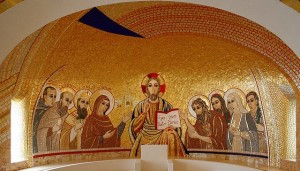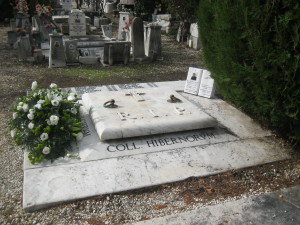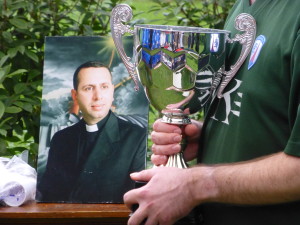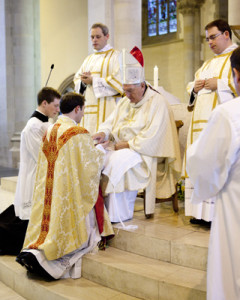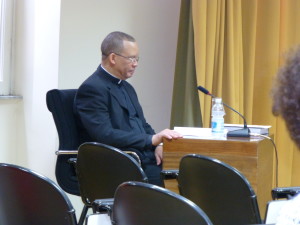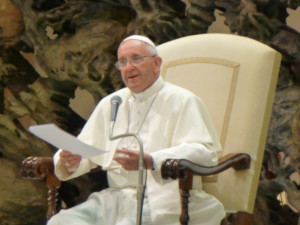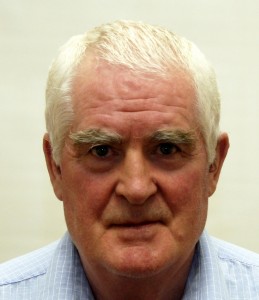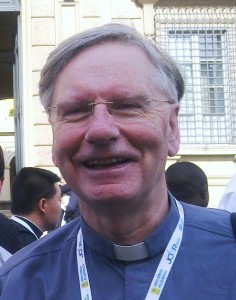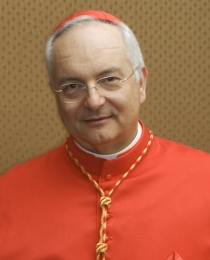All Saints 2013 at Irish College
Posted on 29. Oct, 2013 by John Coughlan in Carousel
For the Solemnity of All Saints on Friday, 1st November 2013, Mass, open to the public, was celebrated at the Irish College at 10am.
Afterwards, the College community visited visit the Irish College grave at Campo Verano cemetery, to pray for the deceased staff and students of the College buried there, praying Prayer During the Day from the Divine Office and the Rosary.
For photographs from the cemetery visit, see http://www.flickr.com/photos/irishcollege/sets/72157637193372545/
Fr Ragheed Ganni Soccer Tournament
Posted on 29. Oct, 2013 by John Coughlan in Carousel
The annual soccer tournament dedicated to the memory of Fr Ragheed Ganni, an Irish College alumnus who was martyred for his faith in Iraq in 2007, was played at the Irish College on Saturday, 9th November 2013. Ragheed came here to the Irish College in 1996 as a seminarian and was ordained priest in 2001. He stayed on in this college as a postgraduate priest until 2003 when he returned to Iraq. During his years in the Irish College, he played on the College soccer team, and so this tournament, the Fr Ragheed Ganni Cup was established in his memory.
This year the competing teams were from the English College, Beda College, North American College, the Marist Order and the Irish College. The winning team was from the Venerable English College. After the presentation of the cup and pizza together, the participants celebrated Vespers in the College Chapel.
For photographs of the occasion, click here.
Exhibition of Art by Eve Parnell
Posted on 05. Sep, 2013 by John Coughlan in Carousel
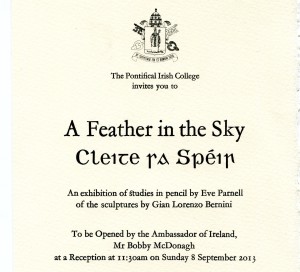
Eight pencil studies by Irish artist Eve Parnell, inspired by the sculptures by Gian Lorenzo Bernini in Rome were exhibited at the Irish College during the month of September 2013. Eve’s monochromes focus on and savour the detail of Bernini’s works.
The opening of the exhibition took place at the Pontifical Irish College, Rome, on Sunday 8th September 2013 at 11.30am. The exhibition was opened by the Irish Ambassador to Italy, Mr Bobby McDonagh.
During the course of the exhibition, prizes donated by sponsors of the exhibition were raffled and proceeds will go to the Community of Sant’Egidio, working with the poor of Rome and for peace in the world.
For photographs of the opening of the exhibition, see http://www.flickr.com/photos/irishcollege/sets/72157635438194104/
Oliver Plunkett Union AGM – 24th Sept 2013
Posted on 01. Sep, 2013 by John Coughlan in Carousel
The Oliver Plunkett Union enables alumni of the Irish College Rome to maintain contact with each other and to show support for the College. The Annual General Meeting of the OPU took place this year in the Hodson Bay Hotel, Athlone, Co. Roscommon on Tuesday 24th September 2013.
The programme was as follows:
11.00am – Golf (optional)
11.00am – Trip from hotel by boat to Clonmacnois (weather permitting) (optional)
3.00pm – Wine and cheese tasting (optional)
5.30pm – Annual General Meeting of the OPU
6.45pm – Vespers
7.15pm – Aperitivi
8.00pm – Union dinner
For further details or queries about the OPU, please contact
Fr George Hayes (President of Oliver Plunkett Union), Vice Rector, Pontificio Collegio Irlandese, Via dei Santi Quattro 1, 00184 Roma, Italy
0r
Fr Michael Duignan (Secretary of Oliver Plunkett Union), St Angela’s College, Lough Gill, County Sligo
or
Fr Colin Grant (Treasurer of Oliver Plunkett Union), Aquinas Grammar School, 518 Ravenhill Road, Belfast BT6 OBY
Ordination to the Priesthood
Posted on 01. Sep, 2013 by John Coughlan in Carousel
Photograph taken by Suzanne at Zanni.ie
Raymond Donnelly, a seminarian of the Pontifical Irish College, Rome, was ordained to the Priesthood in Saint Macartan’s Cathedral, Monaghan, by Bishop Liam McDaid on Sunday 28th July 2013. Fr Raymond has been appointed Curate in the Parish of Enniskillen, Co. Fermanagh.
Also ordained to the Priesthood during Summer 2013 were former Irish College students Fr Micheál McGavigan (Diocese of Derry), Fr Paul Murphy (Archdiocese of Armagh) and Fr Brendan Collins (Diocese of Derry).
Ad multos annos!
Doctoral Defence
Posted on 26. Jul, 2013 by John Coughlan in Carousel
Congratulations to Fr Milciades Florentino Romero, a postgraduate student of the Irish College, who successfully defended his doctoral thesis ‘The Pneumatological Ecclesiology of Yves Congar in his Writings of the Post-Conciliar Period’ at the Gregorian University on Thursday 27th June 2013. His doctoral supervisor was Rev. Prof. Dario Vitali.
Talk by Pope Francis at Year of Faith Vocations Event
Posted on 26. Jul, 2013 by John Coughlan in Carousel
Pope Francis gave a talk to seminarians, novices, and those discerning vocation in the Paul VI Audience Hall on Saturday, 6th July 2013 during this Great Event of the Year of Faith. There was a lively rapport between the Pope and the thousands who were gathered as he gave much wise advice on living the priestly and religious life. Here is the text of his talk:
Good evening!
I asked Archbishop Fisichella whether you understood Italian and he said you all have the translation…. I feel somewhat reassured!
I thank Archbishop Fisichella for his words and his work: he worked hard to organize this. not to mention all the other things he has done and will be doing for the Year of Faith. Thank you very much. However, Archbishop Fisichella said something, and I don’t know if it is true, but I am taking it up: he said that you all want to give your life to Christ forever! You are now applauding, you are celebrating because it is the wedding time…. But when the honeymoon is over, what happens? I heard a seminarian, a good seminarian, who said that he wanted to serve Christ for 10 years, and then he would think about starting a different life…. This is dangerous! However, listen carefully: we are all, even the older people among us, we too, are under pressure from this “culture of the temporary”; and this is dangerous because one does not put one’s stakes on life once and for all. I marry as long as love lasts; I become a woman religious, but only for “a little while…”, “a short time” and then I shall see; I become a seminarian in order to become a priest, but I don’t know how the story will end. This is not right with Jesus! I am not reproaching you, I reproach this culture of the temporary, which hits us all, since it does us no good: because it is very hard today to made a definitive decision. In my day it was easier, because the culture encouraged definitive decisions, whether for married life, consecrated life or priestly life. However, in this day and age it is far from easy to make a decision once and for all. We are victims of this culture of the temporary. I would like you to think about this: how can I be free, how can I break free from this “culture of the temporary”?. We must learn to close the door of our inner cell from within. Once a priest, a good priest, who did not feel he was a good priest because he was humble, who felt he was a sinner, said many prayers to Our Lady; and he said this to Our Lady — I will say it in Spanish because it is beautiful poetry. He told Our Lady that he would never abandon Jesus, saying: “esta tarde, Señora, la promesa es sincera. Por las dudas, no olvide dejar la llave afuera” (“this evening, Mother, the promise is sincere. But in case anything happens, do not forget to leave the key outside”). However he said this with love for the Virgin — people say “Our Lady” — constantly in mind. Yet when someone always leaves the key outside, for any eventuality…. It won’t do. We must learn to close the door from the inside! And if I am not sure, if I am not sure, I think, I shall take my time, and when I feel sure, in Jesus, you understand, because without Jesus no one is safe! — when I feel sure, I will shut the door. Have you understood this? What the culture of the temporary is?
When I entered I saw what I had written. I wanted to say a word to you and the word is “joy”. Wherever there are consecrated people, seminarians, men and women religious, young people, there is joy, there is always joy! It is the joy of freshness, the joy of following Jesus; the joy that the Holy Spirit gives us, not the joy of the world. There is joy! but — where is joy born? It is born… but on Saturday evening shall I be going home or will I go out dancing with my former friends? Is joy born from this? For a seminarian, for example? No? Or yes?
Some will say: joy is born from possessions, so they go in quest of the latest model of the smartphone, the fastest scooter, the showy car…. but I tell you, it truly grieves me to see a priest or a sister with the latest model of a car: but this can’t be! It can’t be. You think: “so do we now have to go by bicycle, Father? Bicycles are good! Mons. Alfred rides a bicycle. He goes by bike. I think that cars are necessary because there is so much work to be done, and also in order to get about… but choose a more humble car! And if you like the beautiful one, only think of all the children who are dying of hunger. That’s all! Joy is not born from, does not come from things we possess! Others say it comes from having the most extreme experiences for the thrill of the strongest sensations: young people like to walk on a knife edge, they really like it! Yet others like the trendiest clothes, entertainment in the most fashionable places — but I am not saying that sisters go to those places, I am saying it of young people in general. Yet others say joy comes from success with girls or with boys, and even from switching from one to another or from one to the other. This is insecurity in love, which is not certain: it is “experimenting” with love. And we could go on…. You too are in touch with this situation which you cannot ignore.
We know that all this can satisfy some desires or create some emotions, but in the end it is a joy that stays on the surface, it does not sink to the depths, it is not an intimate joy: it is momentary tipsiness that does not make us really happy. Joy is not transitory tipsiness: it is something quite different!
True joy does not come from things or from possessing, no! It is born from the encounter, from the relationship with others, it is born from feeling accepted, understood and loved, and from accepting, from understanding and from loving; and this is not because of a passing fancy but because the other is a person. Joy is born from the gratuitousness of an encounter! It is hearing someone say, but not necessarily with words: “You are important to me”. This is beautiful…. And it is these very words that God makes us understand. In calling you God says to you: “You are important to me, I love you, I am counting on you”. Jesus says this to each one of us! Joy is born from that! The joy of the moment in which Jesus looked at me. Understanding and hearing this is the secret of our joy. Feeling loved by God, feeling that for him we are not numbers but people; and hearing him calling us. Becoming a priest or a man or woman religious is not primarily our own decision. I do not trust that seminarian or that woman novice who says: “I have chosen this path”. I do not like this! It won’t do! Rather it is the response to a call and to a call of love. I hear something within me which moves me and I answer “yes”. It is in prayer that the Lord makes us understand this love, but it is also through so many signs that we can read in our life, in the many people he sets on our path. And the joy of the encounter with him and with his call does not lead to shutting oneself in but to opening oneself; it leads to service in the Church. St Thomas said: “bonum est diffusivum sui” — the Latin is not very difficult! — Good spreads. And joy also spreads. Do not be afraid to show the joy of having answered the Lord’s call, of having responded to his choice of love and of bearing witness to his Gospel in service to the Church. And joy, true joy, is contagious; it is infectious… it impels one forward. Instead when you meet a seminarian who is excessively serious, too sad, or a novice like this, you think: but something has gone wrong here! The joy of the Lord is lacking, the joy that prompts you to serve, the joy of the encounter with Jesus which brings you to encounter others to proclaim Jesus. This is missing! There is no holiness in sadness, there isn’t any! St Teresa — there are many Spaniards here and they know it well — said: “a saint who is sad is a sad saint”. It is not worth much…. When you see a seminarian, a priest, a sister or a novice with a a long face, gloomy, who seems to have thrown a soaking wet blanket over their life, one of those heavy blankets… which pulls one down…. Something has gone wrong! But please: never any sisters, never any priests with faces like “chilis pickled in vinegar” — never! The joy that comes from Jesus. Think about this: when a priest — I say a priest, but also a seminarian — when a priest or a sister lacks joy he or she is sad; you might think: “but this is a psychological problem”. No. It is true: that may be, that may be so, yes, it might. It might happen, some, poor things, fall sick…. It might be so. However in general it is not a psychological problem. Is it a problem of dissatisfaction? Well, yes! But what is at the heart of this lack of joy? It is a matter of celibacy. I will explain to you. You, seminarians, sisters, consecrate your love to Jesus, a great love. Your heart is for Jesus and this leads us to make the vow of chastity, the vow of celibacy. However the vow of chastity and the vow of celibacy do not end at the moment the vow is taken, they endure…. A journey that matures, that develops towards pastoral fatherhood, towards pastoral motherhood, and when a priest is not a father to his community, when a sister is not a mother to all those with whom she works, he or she becomes sad. This is the problem. For this reason I say to you: the root of sadness in pastoral life is precisely in the absence of fatherhood or motherhood that comes from living this consecration unsatisfactorily which on the contrary must lead us to fertility. It is impossible to imagine a priest or a sister who are not fertile: this is not Catholic! This is not Catholic! This is the beauty of consecration: it is joy, joy.
However I do not want to embarrass this good sister [addressing an elderly nun in the front row] who was in front of the crowd barrier, poor thing, she was really squashed, but she had a happy face. It did me good to look at your face, sister! You may have had many years of consecrated life, but you have beautiful eyes, you were smiling, you did not complain of being squashed…. When you find examples like this, many sisters, many priests who are joyful, it is because they are fertile, they give life, life, life…. They give this life because they find it in Jesus! In the joy of Jesus! Joy, no sadness, pastoral fecundity.
To be joyful witnesses of the Gospel it is necessary to be authentic and consistent. And this is another word that I want to say to you: “authenticity”. Jesus severely reprimanded the hypocrites: hypocrites, those who think within themselves something other than what they say: those who — to say it clearly — are two-faced. To speak of authenticity to young people costs nothing because the young — all of them — have this wish to be authentic, to be consistent. And you are all disgusted when you find in us priests who we are not authentic, or sisters who are not authentic!
This is a primary responsibility of all adults, of formators. And it is your responsibility, you formators who are here: to set an example of consistency to the youngest. Do we want consistent young people? Are we consistent? On the contrary, the Lord will say to us what he said to the People of God about the Pharisees: “Do what they say but not what they do!”. Consistence and authenticity!
However, you too, in turn, seek to follow this road. I always say what St Francis of Assisi stated: Christ has sent us to proclaim the Gospel with words too. The sentence goes like this: “Always proclaim the Gospel. And if necessary, with words”. What does this mean? Proclaiming the Gospel with an authentic life, with a consistent life. But in this world to which wealth does so much damage it is necessary that we priests, that we sisters, that all of us be consistent with our poverty! But when you find that money is the principal concern of an educational, parochial or indeed any other institution, this is not good. It is not good! It is an inconsistency! We must be consistent and authentic. On this route, let us do what St Francis says: preach the Gospel with our example and then with words! However, it is in our life that others must first be able to read the Gospel! Here too, without fear, with our shortcomings which we try to correct, with our limitations which the Lord knows, but also with our generosity in letting him act through us. Faults, limitations and — I add a little more — with sins…. I would like to know something. Here, in this hall, is there anyone who is not a sinner, who has not sinned? Put up your hand! Put up your hands! No one? No one. From here to the back… everyone! Yet how do I carry my sin, my sins? I want to recommend this to you: be honest with your confessor. Always. Confess everything, do not be afraid. “Father, I have sinned!”. Think of the Samaritan woman who, to test him, in order to tell her fellow citizens that she had found the Messiah, said to him: “you have told me all that I have ever done”, and everyone knew about this woman’s life. Always tell your confessor the truth. This transparency will do us good, because it makes us humble, all of us. “But father, I have got stuck in this, I have done this, I have hated”… whatever it may be. Tell the truth, without hiding anything, without mincing your words, because you are talking to Jesus in the person of the confessor. And Jesus knows the truth He alone always forgives you! But all the Lord wants is for you to tell him what he already knows. Transparency! It is sad when one finds a seminarian or sister who in order to be rid of the stain confesses today with this one; tomorrow he or she goes to another, to another and to yet another: a peregrinatio to confessors in order to hide the truth from them. Transparency! It is Jesus who is listening to you. Always have this transparency before Jesus in the confessor! However, this is a grace. Father I have sinned, I have done this, and this, and this…. with all the words. And the Lord embraces you, he kisses you! Go, sin no more! And if you come back? Once again. I say this from experience. I have encountered many consecrated people who fall into this hypocritical trap of lacking transparency. “I have done this”, humbly. Like the publican at the back of the Temple: “I have done this, I have done that…”. And the Lord shuts your mouth: it is he who cuts you short! But don’t you do it! Do you understand? From one’s own sin grace overflows! Open the door to grace with this transparency!
The saints and teachers of spiritual life tell us that to help us develop our life in authenticity, the daily practice of the examination of conscience is very useful; indeed, it is indispensable. What is happening in my soul? Hence be open, with the Lord and then with the confessor, with the spiritual director. This is so important!
How much more time do we have Archbishop Fisichella?
[Archbishop Fisichella: if you continue talking like this, we shall certainly be here until tomorrow].
He says until tomorrow…. If it is to be until tomorrow, let them bring each one of you a sandwich and a Coca Cola, at least!…
Consistence is fundamental if our witnessing is to be credible. However it is not enough, we also need education, I underline cultural training, in order to account for faith and hope. The context in which we live continually asks us to “account” in this way, and it is a good thing, because it helps us to take nothing for granted. Today we cannot take anything for granted! This civilization, this culture… we cannot. But it is certainly also demanding, it requires a good, balanced formation which combines all the dimensions of life, the human, the spiritual, the intellectual dimension with the pastoral. In your formation there are the four fundamental pillars: spiritual formation, that is, the spiritual life; intellectual life, this means studying “in order to account for”; apostolic life, beginning to go out to proclaim the Gospel; and fourthly, community life. Four. And for the latter, formation must be undertaken in community, in the novitiate, in the priory, in seminaries…. I always think of this: the worst seminary is better than no seminary! Why? Because this community life is essential. Remember the four pillars: spiritual life, intellectual life, apostolic life and community life. These four. You must build your vocation on these four elements.
And here I would like to stress the importance, in this community life, of relations of friendship and brotherhood that are an integral part of this formation. Here we come across another problem. Why do I say this: relations of friendship and brotherhood? So often I have found communities, seminarians, religious or diocesan communities where the most common remarks are gossip! It is terrible! They “flay each other alive”. And this is our clerical or religious world…. Excuse me, but it is common: jealousy, envy, criticism of others. Not only speaking badly of our superiors, that’s a classic! But I want to tell you that this is so common, so very common. I too have fallen into this. I have often done it, often! And I am ashamed of myself! I am ashamed of this. It is not good to do this: to go and gossip: “Have you heard… have you heard?…”. That community is hell. This is not good for us. For this reason relationships of friendship and brotherhood are important. Friends are few. The Bible says this: friends, one or two…. But brotherhood with everyone. If I have some problem with a sister or brother, I say so to his or her face or I say it to someone who can help, but I do not tell others in order to “blacken” their name. And gossip is terrible! Underlying gossip is envy, jealousy and ambition. Think about this. I once heard of a person who after the spiritual exercises — a consecrated person, a sister…. This is good! This sister had promised the Lord never to speak badly of another. This is a beautiful, beautiful way to holiness! Never to speak badly of others. “But father, there are problems”. Tell the superior, tell the Bishop who can remedy them. Do not tell a person who cannot help. This is important: brotherhood! But tell me, would you speak badly of your mother, your father, your siblings? Never. And why do you do so in the consecrated life, at the seminary, in your priestly life? Only this: think, think…. Brotherhood! This brotherly love.
However, in this aspect of friendship and brotherhood there are two extremes: isolation as much as dissipation. Friendship is fraternity that helps me not to fall into either isolation or dissipation. Cultivate friendships, they are a precious good; however they must not teach you to close yourselves in but to go out of yourselves. A priest or a man or woman religious religious can never be an island, but must be a person who is always ready to meet others. Friendships moreover are enriched by the different charisms of your religious families. This is a great wealth. Let us think of the beautiful friendships of many of the saints.
I believe I must cut this a little short, because your patience is never-ending!
[Seminarians: “No no no!”].
I would like to tell you: come out of yourselves to proclaim the Gospel, but to do this you must come out of yourselves to encounter Jesus. There are two ways out: one towards the encounter with Jesus, towards transcendence; the other towards others in order to proclaim Jesus. These two go hand in hand. If you only take one of them, that is no good! I am thinking of Mother Teresa of Calcutta. She was a fantastic sister…. She was not afraid of anything. She went about on the roads…. This woman was not even afraid of kneeling for two hours before the Lord. Do not fear to step out of yourselves in prayer or in pastoral action. Be brave, in order to pray and in order to go and proclaim the Gospel.
I would like a more missionary Church, one that is not so staid. This beautiful Church that makes progress. In these days a large number of missionaries, men and women, have come to the morning Mass here at Santa Marta, and when they greet me they say to me: “But I am an elderly sister; and I have spent 40 years in Chad, I have been here and there…”. How lovely! But you have realized that this sister was able to spend these years in this way because she never neglected to encounter Jesus in prayer. Going out of ourselves, towards transcendence, to Jesus in prayer, towards transcendence, to others in the apostolate and in work. Make your contribution to a Church like this: faithful to the path that Jesus wants. Do not learn from us, from us who are no longer very young; do not learn from us the sport to which we old men so often have recourse: the sport of complaining! Do not learn from us the cult of the “goddess lamentation”. She is a goddess that…. is always complaining…. But be positive, cultivate your spiritual life and, at the same time, go out, be capable of meeting people, especially those most despised and underprivileged. Do not be afraid of going out and swimming against the tide. Be both contemplatives and missionaries. Always keep Our Lady with you and please pray the Rosary…. Do not neglect it! Always keep Our Lady with you at home, as did the Apostle John. May she always accompany you and keep you. And also pray for me, because I too need prayers, because I am a poor sinner, but let us go ahead.
Thank you very much and we shall meet again tomorrow. And on we go, with joy, with consistence, always with the courage to tell the truth, the courage to step out of ourselves to meet Jesus in prayer and to step out of ourselves to encounter others and give the Gospel to them. With pastoral fruitfulness! Please do not be “spinsters” and “bachelors”. Keep forging ahead!
Now, Archbishop Fisichella said that yesterday you recited the Creed, each one of you in your own language. But we are all brothers, we have one and the same Father. Now, each one in his own language, let us recite the Our Father. Let us say the Our Father.
[Recitation of the “Our Father”].
And we also have a Mother. Let us now say the Hail Mary in our own language.
[Recitation of the “Hail Mary”].
Death of Fr Oliver Kennedy SSC, a past Spiritual Director
Posted on 23. Jun, 2013 by John Coughlan in Carousel
The death has occurred of Fr Oliver (Oli) Kennedy SSC who was the Spiritual Director of the Irish College in 2007-8. Ar dheis Dé go raibh a anam.
Funeral Arrangements:
Reposing at St. Columban’s, Dalgan Park, Navan. Office and Prayer for the Dead on Sunday 23rd June 2013 at 7.30pm. Concelebrated Requiem Mass on Monday morning at 11.30am. Burial immediately afterwards in the Community Cemetery.
Life and Ministry of Fr Oliver Kennedy, details provided by the Columban Fathers:
Fr Oliver M.J. Kennedy
(1942 – 2013)
Oliver Kennedy died suddenly in the Columban Nursing Home in Dalgan, on 21st June 2013. Born on 2 June 1942 in Newcastle West, Co. Limerick, he was educated at Mercy Convent school, CBS Tuam, and St Jarlath’s College. Coming from Tuam in those days meant that he came to the Columbans in 1959 with an enviable reputation on the sports field, one that proved well founded and lasted well into his days on mission.
He was ordained in Dalgan Park, Navan on the 21st December 1965 and appointed to Korea. After two years language studies he was assigned to the recently-created diocese of Wonju. After a short time in Wondong city parish, Oliver spent the next ten years in the mountain parishes of Jongson, Hwangji and Pyeongchang. These were poor and isolated places with few Catholics. This was also the time when the military government of Park Chung Hee was clamping down on dissidents liked Bishop Daniel Tji of Wonju. When the bishop was jailed, his diocese led the protest movement in the country and suffered heavy police surveillance. Oliver himself got a 24-hour grilling by the Korean CIA, but he was an obvious target as he stood out head and shoulders over most of the other protesters.
He studied Spirituality in Rome for two years from 1976 and relished the vibrancy of Italian life and the Charismatic Renewal. He returned as pastor of Samchok on the east coast of Korea until he was asked to engage full-time in retreat and spiritual direction work from 1983. He had a brief spell on vocation and retreat ministry in Ireland before returning to Korea to join in building a mission training programme for Columban students and to continue his retreat work with priests and Sisters.
When Oliver left Korea in after 35 years, he was able to take the experience of those years with him into the role of Spiritual Director in the Irish College in Rome, being appointed there in 2007. He enjoyed his work there and reluctantly had to give it up following a severe stroke in 2008. As usual he took on the challenge of dealing with his disabilities and learned to talk and walk again. Oliver gave his life in the service of others and enjoyed doing it. He certainly paid little attention to himself and to his own needs but his family, and many friends throughout Korea and Ireland, will remember his generosity and his friendship for a long time.
May he rest in peace.
New Spiritual Director for Irish College
Posted on 12. Jun, 2013 by John Coughlan in Carousel
At the conclusion of the Summer General Meeting of the Irish Catholic Bishops’ Conference in Maynooth on 12th June 2013, it was announced that Rev. Dr Thomas Norris, a Priest of the Diocese of Ossory, has been appointed as the new Spiritual Director of the Pontifical Irish College, Rome. Fr Tom, an alumnus of the Irish College, is former Professor of Systematic Theology at St Patrick’s College, Maynooth. More recently recently, he has been Paluch Professor of Theology at Mundelein Seminary, Chicago. Fr Norris is a member of the International Theological Commission.
Letter to Seminarians from Prefect of Congregation for the Clergy
Posted on 06. Jun, 2013 by John Coughlan in Carousel
Letter to Seminarians
on the Occasion of the Day for the Sanctification of Priests
The Most Sacred Heart of Jesus
7 June 2013
from Cardinal Mauro Piacanza,
Prefect of the Congregation for the Clergy
Dearest Seminarians,
On the solemnity of the Most Sacred Heart of Jesus, we celebrate most significantly the day for the sanctification of priests and, as you are in the Seminary to respond in the most fitting way possible to your vocation, it is important for me to send you this letter, with great affection, so that you may feel involved and, as such, remember this important occasion.
We contemplate together today the origin of the divine vocation. The Holy Father has emphasised firmly the love in which those who are Priests of Christ and of the Church must participate. In his homily at his first Chrism Mass (28 March 2013), Pope Francis said “This I ask you: be shepherds, with the ‘odour of the sheep’”. By this striking image, the Successor of Peter invites us to have a strong and solid love for the People of God, a love which – as the same Pontiff has noted – is not fed from purely human sources, nor is it reinforced by techniques of self-persuasion. It is the personal encounter with the Lord; it is keeping alive the knowledge of having been called by Him, who gives the truly greater supernatural strength to be Priests in the image of the Good Shepherd of all, Christ Jesus. But in order to be such tomorrow, you have to prepare yourselves today. In very clear words, Pope Francis has referred to the primacy of grace in the priestly life: “It is not in soul-searching or constant introspection that we encounter the Lord: self-help courses can be useful in life, but to live our priestly life going from one course to another, from one method to another, leads us to become pelagians and to minimise the power of grace” (ibidem).
For the disciple walking with Christ, walking in grace, means taking on with spiritual joy the weight of the priestly cross. We hear again the Holy Father teaching about this: “When we journey without the Cross, when we build without the Cross, when we profess Christ without the Cross, we are not disciples of the Lord, we are worldly” (Homily at the Holy Mass with the Cardinals, 14 March 2013). On the contrary, to live our ministry as a service to Christ crucified, prevents us from understanding the Church as a human organisation “a charitable NGO, but not the Church, the Bride of the Lord” (ibidem).
In the light of these first magisterial teachings of Pope Francis, I invite you to consider your life as a gift of God and, at the same time, a task which has been entrusted to you, not simply by men but – albeit by way of the necessary mediation by the Church – ultimately by the Lord himself, who has a plan for your life and for the lives of the brothers and sisters whom you will be called to serve.
It is necessary to view the whole of our life in terms of a divine call, and also of a generous human response. This involves cultivating within ourselves the vocational sense, which interprets life as a continual dialogue with the Lord Jesus, risen and alive. In every age, Christ has called and continues to call men to follow him more closely by participating in his priesthood – that implies that, in every period of the history of the Church, the Lord has held a vocational dialogue with the faithful that He has chosen, so that they may be his representatives among the people of God, as well as mediators between heaven and earth, particularly in the celebration of the liturgy and the sacraments. In fact, one can say that the liturgy opens heaven wide here on earth.
On this basis, you are called through ordination – without any merit of your own – to be mediators between God and his people and to make possible the salvific encounter through the celebration of the divine mysteries. Notwithstanding your own limits, you have responded to this call with generosity and joy. It is important that you always keep alive the sense of youthfulness in your hearts: “We must live the faith with a young heart, always: a young heart, even at the age of seventy or eighty. Dear young people! With Christ, the heart never grows old” (Pope Francis, Homily for Palm Sunday, 24 March 2013, no. 3).
The youthfulness of the priestly spirit, firm in its vocation, is guaranteed by prayer, that is the continually maintained attitude of interior silence which favours listening to God every day. This continual opening of the heart happens, naturally, within a stability that – once the fundamental life decisions have been taken – is capable, with the help of grace, to remain faithful to the tasks which have been solemnly accepted, right up to the end of our earthly life. However, this necessary stability does not imply closing our ear to the ongoing call of God, because the Lord, while confirming us every day in our fundamental vocation, is always at the door of our heart knocking (cf. Acts 3:30), waiting for us to open it to Him with the same generosity with which we said to him our first “fiat”, imitating the availability of the Ever Virgin Mother of God (cf. Lk. 1:38). We can, therefore, never place limits on the plan that God has for us and that he will communicate to us day after day, throughout the whole of our life.
This vocational openness also represents the most certain way to live evangelical joy. It is, in fact, the Lord who will make us truly happy. Our joy does not come from mundane satisfaction, which makes us briefly happy and quickly disappears, as St. Ignatius of Loyola noted in his first spiritual discernment (cf. Liturgy of the Hours, Office of Readings of 31 July, II Reading). Our joy is Christ! In the daily dialogue with Him, our spirit is reassured and continually renews our passion and our zeal for the salvation of souls.
This prayerful dimension of the priestly vocation reminds us of still more very important aspects. First among them is the fact that vocations grow not principally from a pastoral strategy, but above all through prayer. As Jesus taught: “Pray… the Lord of the harvest to send out labourers into his harvest” (Lk. 10:2). Commenting on these evangelical words, Pope Benedict XVI noted: “We cannot simply ‘produce’ vocations; they must come from God. This is not like other professions; we cannot simply recruit people by using the right kind of publicity or the correct type of strategy. The call which comes from the heart of God must always find its way into the heart of man” (Meeting with Priests and Permanent Deacons of Bavaria. 14 September 2006). You, dear Seminarians, have been called by the Lord, but many people spread throughout the world have supported and are supporting your response with their prayers and their sacrifices. Be grateful for this and unite yourselves to these prayers and sacrifices to support other responses to vocations. To the primacy of prayer can then be added, as a channel of this divine grace, the sound, motivated and enthusiastic vocational pastoral action on the part of the Church. With regard to this ecclesial collaboration with the divine work of giving pastors to the People of God and the Mystical Body of Christ, it is appropriate to remember briefly a few matters that mark it out, that is: respect for priestly vocations, the witness of the lives of Priests, the specific work of Seminary formators.
It is first of all necessary that the Church appreciates you for your priestly vocation, considering that the Community of the disciples of Christ cannot exist without the service of the sacred ministers. From this comes the care, attention and reverence for the priesthood. Secondly, vocations are highly favoured, as can be seen from the example and the care that the priests offer them. It would be difficult for an exemplary priest not to stimulate the question in the minds of young people: could I not also be called to a wonderful and happy life like this? Particularly in this way, Priests are channels through which God makes the divine call resound in the heart of those He has chosen. Priests then will nurture the seeds of vocation that begin to spring in the souls of the young, by means of sacramental Confession, spiritual direction, preaching and pastoral enthusiasm. I am sure that many of you will be witnesses to and beneficiaries of this.
I would, furthermore, like to say a word about the important role of those priests to whom the Bishops entrust your formation. The Seminary formators are called to continue and to deepen the care for priestly vocations, while they provide all the required help for the necessary personal discernment of every candidate. As to this, we must remember the two principles which must guide the evaluation of vocations: the friendly welcome and the just severity. While every prejudice as well as every rigorsim should be avoided in the treatment of seminarians, on the other hand it is of the greatest importance to guard carefully against laxism and carelessness in judgment. The Church certainly needs Priests, but not any kind of Priest! The love that welcomes must therefore accompany the truth which judges with clarity whether, for a particular candidate, the signs of a vocation and the human qualities necessary for a trustworthy response to it are present. The pastoral urgency of the Church cannot be permitted to bring about haste in conferring the sacred ministry. On the contrary, where there is doubt, it is better to take the time necessary and carry out appropriate evaluations, which will not exclude the dismissal of those candidates who are not able to offer sufficient guarantees.
My dearest Seminarians, with these brief comments, I have endeavoured to redirect our spiritual attention to the immense gift and to the absolutely free mystery of our special vocation. We entrust to the intercession of our most holy Mother Mary and of St. Joseph the gifts of fidelity and of perseverance in the divine call that, by pure grace, they may be bestowed upon us and that we may seek to respond to the divine generosity, which always sends pastors for the flock with renewed apostolic zeal. Keep persevering, always remembering that we show our love in this world by our fidelity.
I remember you each day in prayer with great affection, and I implore the Lord to send down his divine benediction upon you.
Mauro Cardinal Piacenza
Prefect
Congregation for the Clergy

